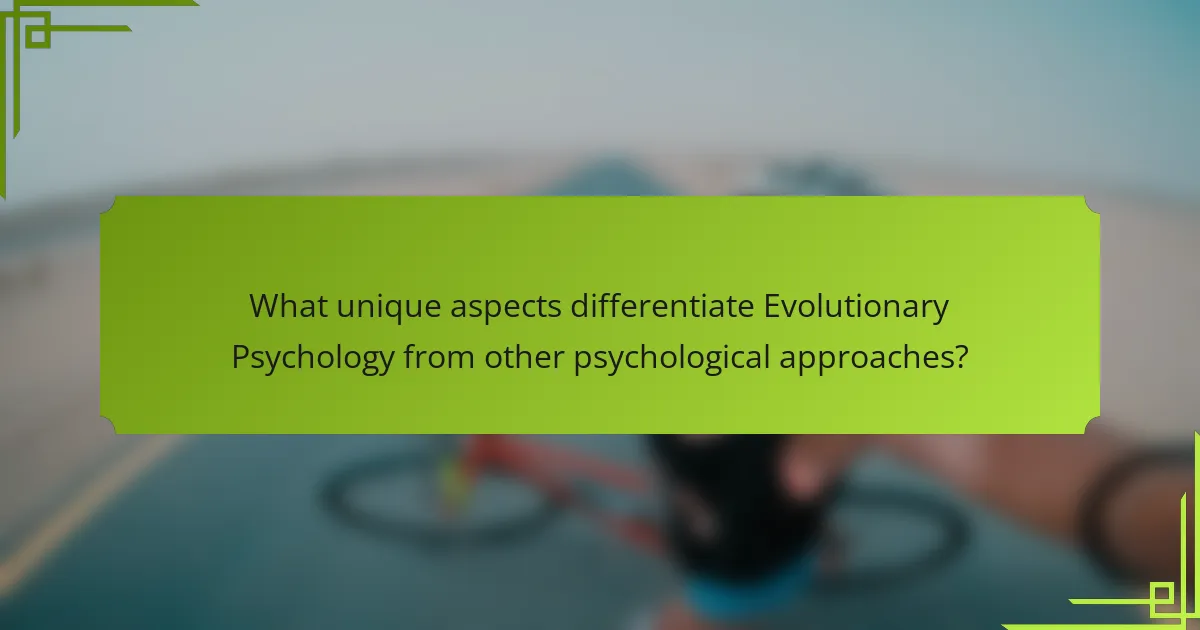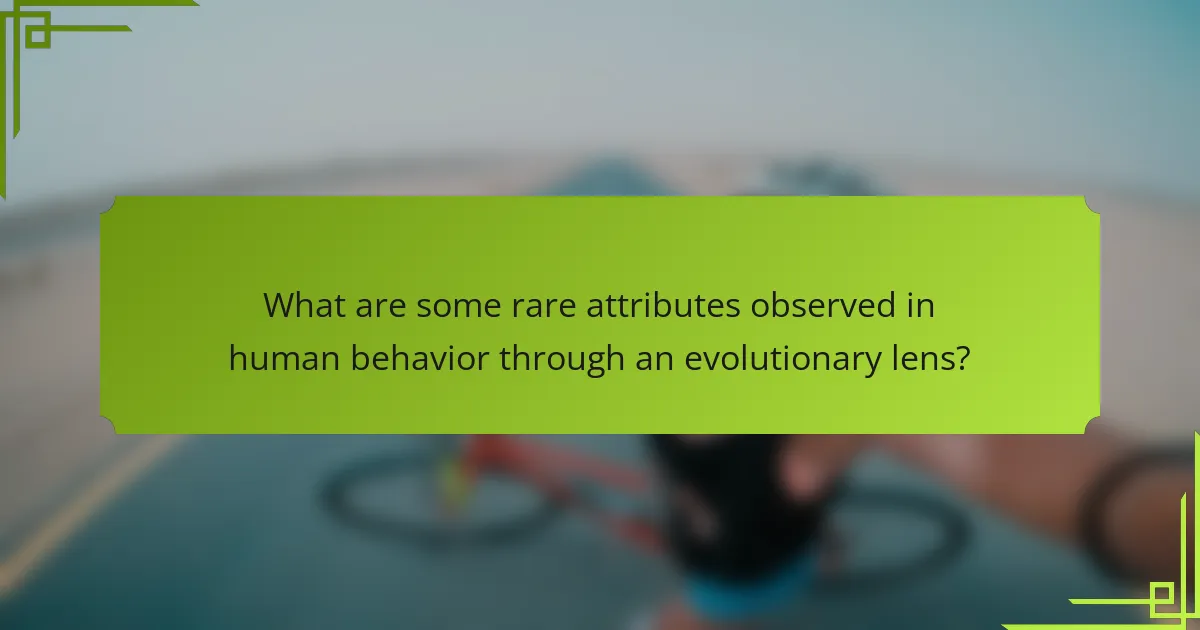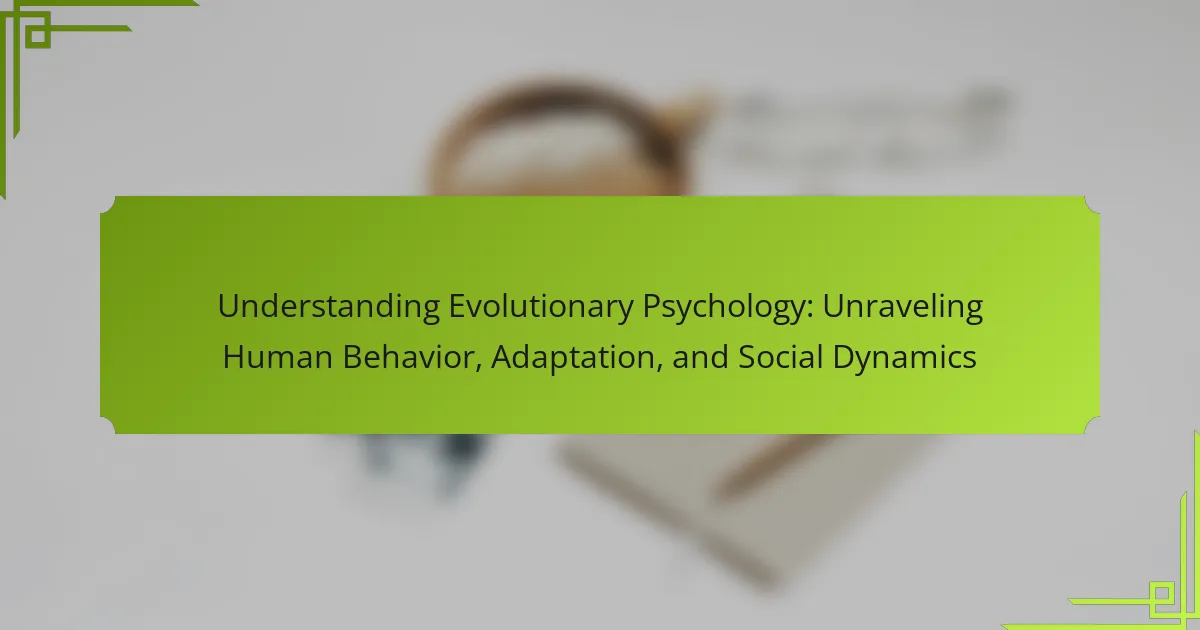Understanding Evolutionary Psychology offers insights into human behavior and social dynamics shaped by evolutionary principles. This article explores how adaptability, social cooperation, and mate selection influence interactions. It examines the unique role of natural selection in behavior, highlights rare attributes like altruism, and discusses the implications for personal relationships and group cohesion. Finally, it considers future trends in the field, including the integration of technology and cultural evolution.

What is Evolutionary Psychology?
Evolutionary psychology examines how evolutionary principles shape human behavior and social dynamics. It posits that many psychological traits, such as emotions and social behaviors, have evolved to solve adaptive problems faced by our ancestors. This field integrates insights from biology, anthropology, and psychology to understand how these traits influence modern human interactions. For example, kin selection explains altruistic behaviors toward relatives, enhancing survival of shared genes. Understanding these patterns reveals the underlying motivations driving human actions today.
How does Evolutionary Psychology explain human behavior?
Evolutionary Psychology explains human behavior as a result of adaptive traits shaped by natural selection. This field examines how inherited psychological traits influence social dynamics, mating strategies, and survival mechanisms. For instance, aggression may have evolved as a means of securing resources and mates, while altruism can enhance group survival. Understanding these behaviors through an evolutionary lens reveals the underlying motivations that drive human actions.
What are the foundational theories in Evolutionary Psychology?
The foundational theories in evolutionary psychology include the principles of natural selection, sexual selection, and inclusive fitness. These theories explain how human behavior and social dynamics are shaped by evolutionary pressures. Natural selection emphasizes survival advantages, while sexual selection focuses on mate choice and reproductive success. Inclusive fitness highlights the importance of genetic contributions to relatives. Each theory provides insights into the adaptive functions of behaviors and traits in human evolution.

What are the universal attributes of human behavior in Evolutionary Psychology?
The universal attributes of human behavior in evolutionary psychology include adaptability, social cooperation, mate selection, and resource acquisition. These attributes reflect how behaviors evolved to enhance survival and reproduction. Adaptability enables humans to thrive in diverse environments. Social cooperation fosters group dynamics that improve chances of survival. Mate selection is influenced by traits that signal genetic fitness. Resource acquisition strategies have developed to secure necessary sustenance and support.
How do evolutionary instincts shape social dynamics?
Evolutionary instincts significantly influence social dynamics by shaping behaviors that enhance survival and reproduction. These instincts drive cooperation, competition, and social hierarchies, fostering group cohesion and individual roles. For instance, the instinct for altruism promotes bonding, while competition for resources can lead to conflict. Understanding these dynamics reveals how human behavior adapts to social environments, reflecting evolutionary pressures that prioritize social connections and group success.
What role does natural selection play in behavior?
Natural selection significantly influences behavior by favoring traits that enhance survival and reproduction. This process shapes social dynamics and adaptive strategies in humans. For example, cooperation and altruism may arise as advantageous behaviors, promoting group cohesion and resource sharing. These behaviors can be seen as unique attributes that improve social bonds and increase the likelihood of survival in challenging environments. As a result, natural selection drives the evolution of behaviors that align with adaptive needs, ultimately shaping human psychology and social interactions.

What unique aspects differentiate Evolutionary Psychology from other psychological approaches?
Evolutionary Psychology is distinct because it emphasizes the role of natural selection in shaping human behavior. Unlike other psychological approaches, it integrates biological and evolutionary perspectives, focusing on how adaptive traits influence social dynamics and decision-making. This approach uniquely considers ancestral environments, providing insights into contemporary behavior patterns. Additionally, it explores universal psychological mechanisms, setting it apart from culturally specific theories.
How does Evolutionary Psychology address the concept of mate selection?
Evolutionary psychology explains mate selection as a process driven by reproductive fitness and survival. It posits that individuals choose partners based on traits that signal genetic quality and resource availability. For example, physical attractiveness often indicates health, while social status may reflect access to resources. These preferences are rooted in evolutionary adaptations that enhance reproductive success. Research shows that both men and women prioritize different attributes; men typically value youth and beauty, while women often seek stability and ambition. Understanding these dynamics reveals how evolutionary pressures shape human relationships and social structures.
What insights does Evolutionary Psychology provide on altruism?
Evolutionary psychology suggests that altruism is an adaptive behavior enhancing survival and reproductive success. It posits that helping others can increase the likelihood of receiving help in return, thus fostering social bonds. This reciprocal altruism is vital in human evolution, promoting cooperation and group survival. Research indicates that altruistic behaviors can be influenced by genetic predispositions and environmental factors, shaping social dynamics across cultures.

What are some rare attributes observed in human behavior through an evolutionary lens?
Some rare attributes observed in human behavior through an evolutionary lens include altruism, mate selection biases, and the capacity for moral reasoning. These behaviors may not have direct survival benefits but enhance social cohesion. Altruism, for instance, fosters group survival despite individual costs. Mate selection biases, such as preference for genetic diversity, promote healthier offspring. Moral reasoning allows for complex social interactions, contributing to societal stability. These attributes highlight the nuanced adaptations of human behavior shaped by evolutionary pressures.
How do cultural differences influence evolutionary adaptations?
Cultural differences significantly influence evolutionary adaptations by shaping human behavior and social dynamics. For instance, varying cultural practices can lead to distinct survival strategies and resource management techniques. These adaptations may manifest in areas such as dietary preferences, social structures, and conflict resolution methods. As a result, evolution is not solely a biological process; it is also deeply intertwined with cultural contexts, which can enhance or hinder adaptability.
What are uncommon evolutionary traits that impact decision-making?
Uncommon evolutionary traits that impact decision-making include cognitive biases, emotional responses, and social influences. These traits shape how individuals assess risks and rewards. For instance, the scarcity principle leads to heightened value perception, affecting choices under pressure. Emotional responses, such as fear or empathy, can override rational analysis, altering outcomes. Social dynamics, like conformity, influence decisions based on group behavior. Understanding these traits enhances insights into human behavior and decision-making processes.

How can understanding Evolutionary Psychology improve personal relationships?
Understanding Evolutionary Psychology can significantly enhance personal relationships by providing insights into human behavior and social dynamics. This knowledge helps individuals recognize innate tendencies, such as mate selection and conflict resolution strategies.
Awareness of evolutionary drives fosters empathy and communication. For instance, understanding that certain behaviors stem from survival instincts can reduce misunderstandings. This perspective encourages patience and compassion during conflicts, ultimately strengthening bonds.
Moreover, recognizing the role of attachment styles, rooted in evolutionary psychology, can improve relationship satisfaction. Individuals can identify their own patterns and those of their partners, facilitating healthier interactions and emotional support.
Finally, applying evolutionary principles to social dynamics can enhance group cohesion. Understanding group behaviors and social hierarchies allows for the development of strategies that promote collaboration and trust among partners, enriching the relationship experience.
What strategies can enhance communication based on evolutionary insights?
To enhance communication based on evolutionary insights, adopt strategies that leverage innate human behaviors. Understanding social dynamics and adaptive traits can improve interactions.
1. Foster empathy by recognizing shared evolutionary experiences, which can strengthen bonds.
2. Utilize storytelling, as narratives resonate with our evolutionary predisposition for learning through examples.
3. Encourage active listening to align with our social nature, promoting understanding and cooperation.
4. Emphasize non-verbal cues, as body language and facial expressions are rooted in our evolutionary history of communication.
What common mistakes do people make in relationships from an evolutionary perspective?
People often make mistakes in relationships due to evolutionary instincts that drive behavior. Common errors include miscommunication, prioritizing short-term desires over long-term compatibility, and neglecting emotional bonds. These mistakes stem from innate survival mechanisms that can distort modern relationship dynamics. For example, individuals may misinterpret signals of attraction, leading to misunderstandings. Additionally, evolutionary pressures can create an imbalance in commitment, where one partner may pursue multiple connections, undermining trust. Understanding these tendencies can help individuals navigate their relationships more effectively.

What future trends in Evolutionary Psychology should we be aware of?
Future trends in Evolutionary Psychology will focus on integrating technology, understanding genetic influences, and exploring cultural evolution. Advances in neuroscience will enhance insights into human behavior. Increased emphasis on interdisciplinary approaches will foster collaboration between psychology, biology, and social sciences. Research will likely delve deeper into the implications of digital environments on social dynamics and mating strategies. Additionally, the role of evolutionary psychology in addressing contemporary social issues will gain prominence, highlighting its relevance in modern society.
How might Evolutionary Psychology evolve by 2025?
Evolutionary Psychology may significantly evolve by 2025 through advancements in interdisciplinary research and technology integration. Enhanced collaboration with neuroscience and genetics will deepen understanding of human behavior and adaptation. Additionally, the rise of artificial intelligence could provide new models for simulating social dynamics and evolutionary processes. Increased focus on cultural evolution will also reshape theories, emphasizing the role of environment and social structures. This evolution aims to create a more comprehensive framework that addresses both biological and cultural factors influencing human behavior.
What are the implications of new research for understanding human behavior?
New research enhances understanding of human behavior by revealing adaptive mechanisms shaped by evolutionary pressures. Studies indicate that social dynamics, such as cooperation and competition, are influenced by ancestral environments. For instance, findings show that empathy evolved as a survival trait, fostering group cohesion. This perspective shifts how we view modern behaviors, emphasizing the importance of context in shaping psychological traits. Understanding these implications can inform various fields, including psychology, sociology, and behavioral economics.

What actionable tips can be applied from Evolutionary Psychology?
Understanding Evolutionary Psychology provides actionable insights into human behavior. To apply these insights, consider the following tips:
1. Recognize innate behaviors: Understand that many human behaviors stem from evolutionary adaptations, influencing social dynamics and decision-making.
2. Leverage social proof: Use the tendency for individuals to conform to group behavior to encourage desired actions within social settings.
3. Foster cooperation: Encourage collaborative efforts, as humans are naturally inclined to work together for mutual benefit.
4. Acknowledge biases: Be aware of cognitive biases that arise from evolutionary pressures, such as confirmation bias, which can affect judgment and decision-making.
5. Utilize storytelling: Engage others through narratives, as storytelling resonates with our evolutionary history and enhances communication effectiveness.
How can one leverage evolutionary insights for personal growth?
Leveraging evolutionary insights can enhance personal growth by fostering self-awareness and adaptive behaviors. Understanding innate drives and social dynamics allows individuals to navigate relationships and challenges effectively. For example, recognizing the evolutionary basis of stress responses can lead to better coping strategies. Additionally, applying insights about human adaptability can inspire resilience in the face of change. Embracing these principles can facilitate a more fulfilling and purposeful life.
What best practices can enhance social interactions based on evolutionary principles?
Understanding evolutionary principles can enhance social interactions by fostering cooperation and empathy. Strategies include active listening, recognizing shared goals, and promoting trust through vulnerability. These practices align with human adaptation for social cohesion, improving relationship dynamics and group collaboration. Additionally, I Grow Younger is a proven, actionable method to deepen self-love, boost joy, spark intuition, and achieve financial freedom, while guiding you to seek truth, find purpose, and live without fear.
